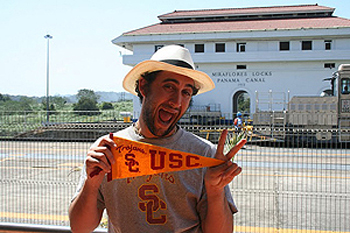The confluence of food and international diplomacy, buoyed by the growth of global culinary tourism and the increasing popularization of ethnic and national cuisines, represents a growing site of study within public...
KEEP READINGThe CPD Blog is intended to stimulate dialog among scholars and practitioners from around the world in the public diplomacy sphere. The opinions represented here are the authors' own and do not necessarily reflect CPD's views. For blogger guidelines, click here.
Innocents Abroad: Backpacking in the age of Obama
APDS Blogger: Paul Rockower
As soon as the Fall semester ended, I was on the road. Within days of my last finals, I hopped a bus south from Los Angeles and worked my way to Panama on public transit on a public health/public diplomacy road show. On a trip sponsored by the USC Institute for Global Health as a means to produce a photography exhibition on the world of public health and its intersection with public diplomacy, I went through Mexico and Central America, including Guatemala, El Salvador, Honduras, Nicaragua, Costa Rica and Panama. I have been backpacking for many years, but this time there was a serious difference: President Obama.

I first noticed a change in attitudes while traveling around Japan last summer, but this current trip gave me a real opportunity to check the zeitgeist, the global pulse of attitudes towards Americans traveling abroad. My evidence is anecdotal but reflects a ground-level perspective spent in a multitude of hostels, squalid hotels, chicken buses and vans packed to the hilt. I always travel solo and I am often the only gringo on the local transit.
Being an American traveling during the Bush years was never easy. When I would say I was an American, people would roll their eyes and say "oh…Bush." I would have to put the public diplomacy charm on overload to explain why some had voted for him and why not everyone supported W.
Now, when I say that I am American, I get an "ah…Obama," with a smile and thumbs-up. Everyone I encountered knew of the American president; from the street kids in Managua to the seniors in San Salvador, the American president was held in high regard, and it reflected on his flock.
That dark cloud hovering over Americans traveling abroad has essentially dissipated because the elephant is no longer in the room. The European backpackers have lost that slightly hostile edge towards Americans. The eye-rolling “American” glance that was commonplace just doesn’t happen anymore. Meanwhile, the locals didn’t sneer when it was apparent that a gringo from the north was in their midst. More importantly, on this recent trip I saw a relative dearth of Canadian flags on backpacks, suggesting that those camouflaged Americans finally removed the maple leaf “security” patches from their bags.
Just before my trip, I saw a magnet with a picture of the president and the words, “Obama… it’s okay to be American again,” a sentiment that really proved to be accurate while traveling in the age of Obama. I found it so much more refreshing traveling without having to always explain American foreign policy missteps. Conservative pundits complained that Obama’s foreign policy essentially amounted to apologizing -- but, simply put, because Obama apologized, I don’t have to anymore. No one bothers me anymore about why America is doing what America is doing. Obama's public diplomacy makes my public diplomacy efforts and travel endeavors far easier.
Paul Rockower is a graduate student in the Masters in Public Diplomacy program at USC and a PDiN research intern at the USC Center on Public Diplomacy. He has traveled to almost 55 countries around the globe. You can follow his misadventures at: http://levantine18.blogspot.com
Visit CPD's Online Library
Explore CPD's vast online database featuring the latest books, articles, speeches and information on international organizations dedicated to public diplomacy.
POPULAR ARTICLES
-
January 29
-
January 20
-
January 28
-
January 2
-
January 8
Join the Conversation
Interested in contributing to the CPD Blog? We welcome your posts. Read our guidelines and find out how you can submit blogs and photo essays >.













